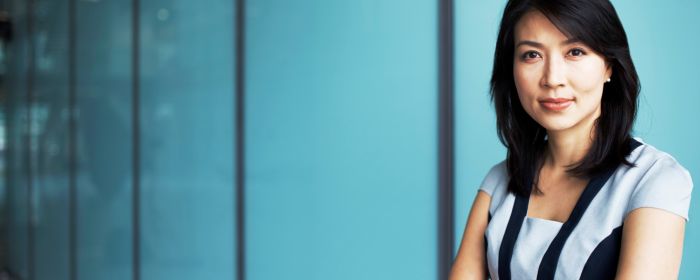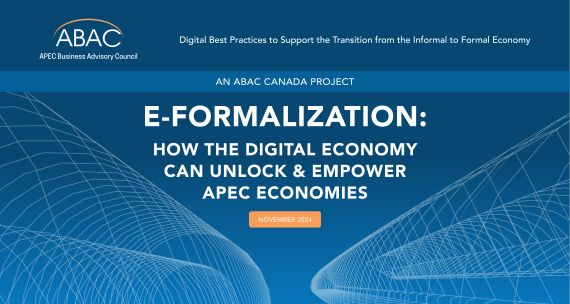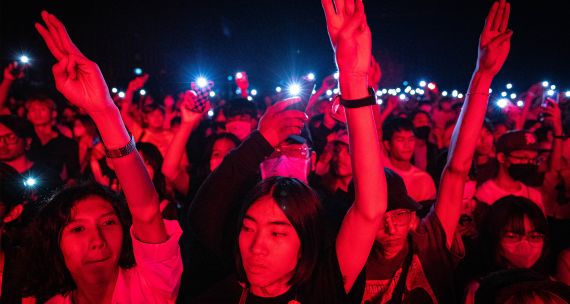The Asia Pacific Youth Council’s (APYC) Vancouver chapter hosted its first online Talk to Me About Asia event, ‘Women in Business,’ on May 27, 2020. Through the Talk to Me About Asia series, students and young professionals have the opportunity to learn from the experiences and insights of globally-engaged entrepreneurs, businesspeople, and others whose work intersects with the Asia Pacific. Previous discussions have focused on Launching Your Global Career, Exploring the Social Entrepreneurship Ecosystem, and Launching and Growing Startup Businesses.
The Asia Pacific Youth Council is a Vancouver-area initiative of young professionals and students engaging their peers and other community members on issues of interest and importance in the Canada-Asia relationship. The speakers’ comments have been edited for brevity.
The Speakers
Anna Chan, Founder and CEO of myMomentum, a lifestyle and community platform that promotes healthy living through tech and offline events.
Natasha Jung, Founder and Executive Producer of Cold Tea Collective, a media company and community for, by, and about Asian millennials.
Amar Nijhawan, Program Manager and Gender Equality Lead at the Canadian International Resources Development Institute (CIRDI).
The Moderators
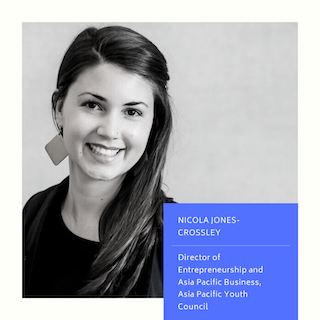 Nicola Jones-Crossley, APYC Director of Entrepreneurship and Asia Pacific Business.
Nicola Jones-Crossley, APYC Director of Entrepreneurship and Asia Pacific Business.
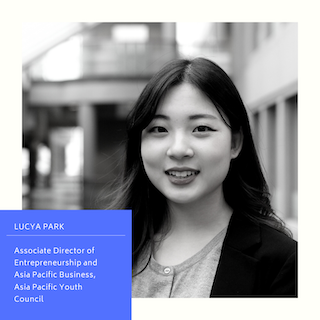 Lucya Park, APYC Associate Director of Entrepreneurship and Asia Pacific Business.
Lucya Park, APYC Associate Director of Entrepreneurship and Asia Pacific Business.
Q: To start with, could you describe how the COVID-19 pandemic has impacted your work?
Amar: Normally, we work internationally, so we’ve had to quickly adjust how we conduct workshops, training, and courses to clients abroad in a digital format. In addition to tracking any changes in natural resource governance, we’re also tracking the immediate health impact of the pandemic and the longer-term economic impact, including on marginalized women.
Natasha: In our case, we’ve had to cancel events, and some of our partnership deals had to be put on hold. But we’re getting back on track. In addition to adapting as a company, we’ve also had to give ourselves time to adapt at the personal level. We’ve opened a space for a continued conversation around it. One thing that’s helped is that in our North America-wide WhatsApp chat of Cold Tea Collective contributors, we’ve shared how we’ve addressed the racist attacks that are happening in our community and resources to support one another.
Anna: For our business, it was really a decision of whether we can go on and whether there is something we can do during this time. I’ve been trying to run this startup and support my team while continuing to build community in wellness – an industry that has been hit hard by COVID-19 and the lockdown.
One pillar of our work was hosting offline events. When we had to quickly adapt by moving those online by leaning heavily on our other pillar – our app. We also created swag bags – I’ve hand-delivered 500 of those in the past 10 weeks as part of my commitment to the community, and it was totally worth the time and effort.
Q: Pivoting now to the main topic of our discussion, how have you seen attitudes toward women in business change over time, especially in the context of Asia? What changes would you like to see?
Anna: When I was working in Shanghai, there was a big wave of getting women into senior roles in all types of companies – startups, small and medium-sized, and even big multinationals, from mid-level all the way to senior executive.
Amar: Based on my experience working with women entrepreneurs in Indonesia, Vietnam, the Philippines, and Peru, as well as through my own research with women startup founders in Pakistan, I’ve seen some positive changes. There are a lot more organizations, platforms, and collectives for women to convene and share their experiences. Many women I talked to mentioned that these didn’t exist before. Also, these new platforms are responding to what women in these countries need, rather than just importing a one-size-fits-all model from someplace like Silicon Valley.
Natasha: I can’t speak to how attitudes toward women in business in Asia have changed over time from personal experience, but women in general are collaborative in nature – there’s a lot of research to support that – and that’s where I think women can really model what collaboration and business look like across borders. For example, on the culture side of things, where previously we were bound by international borders and support from broadcasters, there are more American or Canadian record labels that have extended their reach to Asia, or vice-versa.
Q: For someone who is planning to head to Asia, how can they start networking? And do you have any tips for networking in general?
Anna: When I first went to China, I just kind of ‘showed up,’ and it turned out the local Canadian Chamber of Commerce was hosting an event that night. So I attended and met so many great people, including, of course, a lot of ex-pats. There are a lot of these Chambers in China and Asia, and they are a great resource as long as you’re willing to put yourself out there.
Natasha: When you go to a networking event, think about your end goal and remind yourself why you’re there. But don’t overwhelm yourself with expectations that you’ll walk out of that event with a job. After all, relationships are built over time.
I find that it helps to dress comfortably – I’ve stopped wearing high heels for that reason. Also, smile, take a deep breath and remind yourself to be human. Don’t worry about being perfect or too scripted – just focus on doing active listening and learning about the people you meet. That will show them that you’re interested.
Anna: For a lot of us, we have had to try to overcome imposter syndrome, especially when we’re in roles that come with such big expectations. Those expectations can be especially high if you’re at a company whose main focus is fast growth. When you feel like an imposter, that certainly impacts your confidence. It’s important to continue to hear people’s real stories because so many people go through that.
Amar: Imposter syndrome is still so real. I wish I had solutions to that, but it’s something we learn to deal with over time. I find it helps to just talk to people in your space, no matter who they are, as long as you can draw inspiration from them.
(Nicky also suggested that people in tech should check out Startup Grind, which does networking events all over the world.)
Q: Should we be giving special consideration to cultural differences when doing business in Asia?
Amar: Speaking from a policy and programmatic perspective, we, of course, have to recognize that every country has different needs and may require a different approach. That includes assessing whether an example of entrepreneurship is necessity-driven or opportunity-driven. Some of the most vulnerable populations in the countries I’m familiar with are women working in the informal sector who are necessity-driven entrepreneurs. They certainly wouldn’t be your typical startup with access to venture capital, as is the case with many opportunity-driven entrepreneurs.
Q: Are there any questions you get tired of hearing about being a woman in business?
Amar: I see a lot of training and programs meant to build women’s confidence. While it’s true that imposter syndrome is real, overall, women entrepreneurs are already extremely confident and determined. So then why is this confidence narrative always at the forefront? Another myth is that women are more risk-averse. But research shows that’s not the case at all; rather, women take the time to make sure their assets, their messaging, and their plan are in order before they go ahead with their business, sometimes because they need to take into consideration not just themselves, but also their families and communities.
Anna: The point about funding is something I think about – that is, the question about how to seek funding as a woman. Of course, now I’m revisiting this issue, but I would like to have that conversation not as a “woman entrepreneur,” but just as an entrepreneur.
Natasha: To be honest, one of the questions I get tired of hearing is: “What does it mean to be a woman in business?” This is like asking someone what it’s like to wake up every day or have use of their five senses – inherent to the tone of the question is that being a woman in business is unique or unheard of. Of course, there are specific challenges that women might face, such as access to capital, which is an entirely different conversation, but we should be pushing the narrative in a positive direction.
Speaker Bios
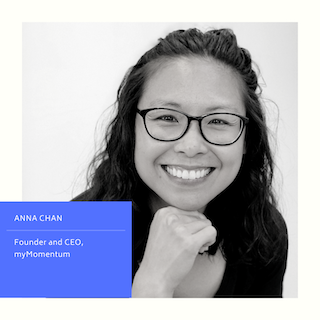 Anna Chan is the Founder and CEO of myMomentum and a true believer in doing what you love! Passionate, energetic, and people-oriented, she loves to inspire, encourage, and motivate people to move closer to their goals, whether it be in health and fitness, wellness, startups, or in life in general.
Anna Chan is the Founder and CEO of myMomentum and a true believer in doing what you love! Passionate, energetic, and people-oriented, she loves to inspire, encourage, and motivate people to move closer to their goals, whether it be in health and fitness, wellness, startups, or in life in general.
After eight years in a corporate career (Canada), Anna moved to Shanghai, where she ventured down an entrepreneurial path. For six-plus years, she helped startups of different stages either launch or grow, her last role taking her beyond Mainland China to Hong Kong, Singapore, and Indonesia. As amazing as the opportunity was, the roles took a toll on her and in 2017, Anna decided to repatriate back to Vancouver and focus on family plus wellness (her own and others).
With a strong urge to create her own business and a passion for wellness, Anna founded myMomentum in early 2017, a lifestyle and community platform that promotes healthy living through tech and offline events. myMomentum launched in Vancouver just under a year ago, with more than 2,000 people now actively supporting the community. Anna views having the right team and leading with purpose and value alignment as the reason for myMomentum’s success thus far. This may mean doing things the ‘untraditional’ way, but often that leads to innovative product solutions and creating an impact that is just as powerful offline as it is online.
Startup aside, she is a mom to a two-year-old boy and a two-year-old puppy. She loves to travel (usually a one-way ticket with no set plans) and has explored the corners of more than 40 countries. Her spontaneity has led her to ride the trans-Siberian rail across Russia, volunteer in Peru, hike in Sri Lanka, ride camels across the desert in Mongolia, and, more recently, live and work in China.
Find Anna on Linkedin.
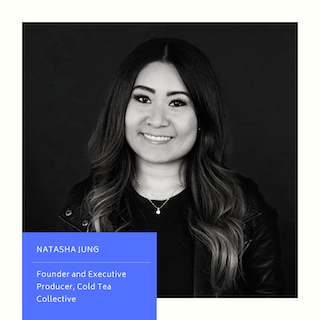 Natasha Jung is a multi-disciplinary creative and leader with a passion for diverse storytelling, community and people. She is the Founder and Executive Producer of Cold Tea Collective, a media company and community for, by and about Asian millennials navigating their identities through storytelling. She founded this collective when she experienced a transformational stage in her life and saw the value in hearing and seeing stories she and her peers could identify with on a cultural level. Since 2017, Cold Tea Collective has shared stories from the cast of Crazy Rich Asians, Riverdale, Marvel films, and more, while also sharing the stories of everyday Asian youth across North America. Natasha has also worked in the fields of broadcast media, marketing, education, and technology.
Natasha Jung is a multi-disciplinary creative and leader with a passion for diverse storytelling, community and people. She is the Founder and Executive Producer of Cold Tea Collective, a media company and community for, by and about Asian millennials navigating their identities through storytelling. She founded this collective when she experienced a transformational stage in her life and saw the value in hearing and seeing stories she and her peers could identify with on a cultural level. Since 2017, Cold Tea Collective has shared stories from the cast of Crazy Rich Asians, Riverdale, Marvel films, and more, while also sharing the stories of everyday Asian youth across North America. Natasha has also worked in the fields of broadcast media, marketing, education, and technology.
A community-minded leader, Natasha is the Past-Chair of the Leaders of Tomorrow Program with the Greater Vancouver Board of Trade, has participated in several non-profit boards. In 2013, she was named one of Richmond’s “30 Under 30” and has also been recognized by the United Global Chinese Womens’ Association of Canada and Deloitte Canada for her work in youth leadership development and entertainment arts. In 2019, Natasha delivered her first TEDx talk and looks forward to celebrating International Womens’ Day with the Asia Pacific Foundation.
Find Natasha on LinkedIn.
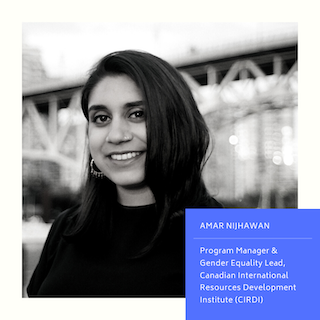 Amar Nijhawan is a Program Manager and Gender Equality Lead at the Canadian International Resources Development Institute (CIRDI), an independent centre of expertise in natural resource-led development based at the University of British Columbia. Before joining CIRDI, Amar worked at the Asia Pacific Foundation of Canada and led a $2.8-million Asia Pacific Economic Cooperation (APEC) and Global Affairs Canada initiative that focused on micro, small and medium enterprise development, innovation policy, and entrepreneurship in Vietnam, the Philippines, Indonesia, and Peru.
Amar Nijhawan is a Program Manager and Gender Equality Lead at the Canadian International Resources Development Institute (CIRDI), an independent centre of expertise in natural resource-led development based at the University of British Columbia. Before joining CIRDI, Amar worked at the Asia Pacific Foundation of Canada and led a $2.8-million Asia Pacific Economic Cooperation (APEC) and Global Affairs Canada initiative that focused on micro, small and medium enterprise development, innovation policy, and entrepreneurship in Vietnam, the Philippines, Indonesia, and Peru.
Amar has also worked in the non-profit world in India, specifically with women survivors of state violence in New Delhi. Amar holds an MSc from the Gender Institute at the London School of Economics and Political Science, and a B.A in Political Science and International Development Studies from McGill University.
Find Amar on LinkedIn.
